Submissions Portal Closed
The Awards
We are delighted to celebrate the successful conclusion of the 2025 Awards for Excellence in Waste Management for NHS Trusts in England. This year’s programme shone a spotlight on the outstanding achievements, innovation, and dedication of secondary care waste management teams across the NHS — recognising their pivotal role in advancing sustainability and improving waste practices across healthcare.
Our awards ceremony at the Royal Armouries on 2nd October 2025 was a fantastic evening celebrating the successes of our winning teams and finalists. Information on the 2025 winners and their submissions can be found below.
We are now busy preparing the 2026 Awards Programme, which will continue to highlight and reward excellence, innovation, and collaboration across NHS Trusts. Further details — including categories, key dates, and how to enter — will be shared soon.
If you are interested in sponsoring an award category or another element of the 2026 programme, please email us or contact us via the web chat to find out more about the opportunities available.
The Award Categories
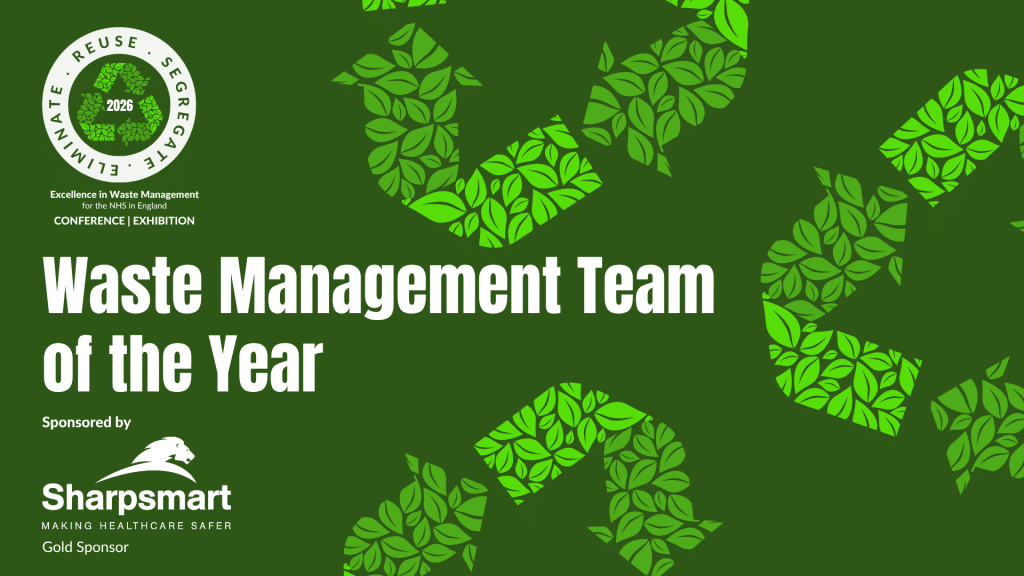
Recognising the exceptional collaborative efforts of a secondary care waste management teams within NHS Trusts in England that has demonstrated outstanding innovation, efficiency, and environmental responsibility. Highlighting the team that has shown exceptional dedication to educating healthcare staff and the community about the importance of waste management, fostering a culture of responsibility and sustainability.
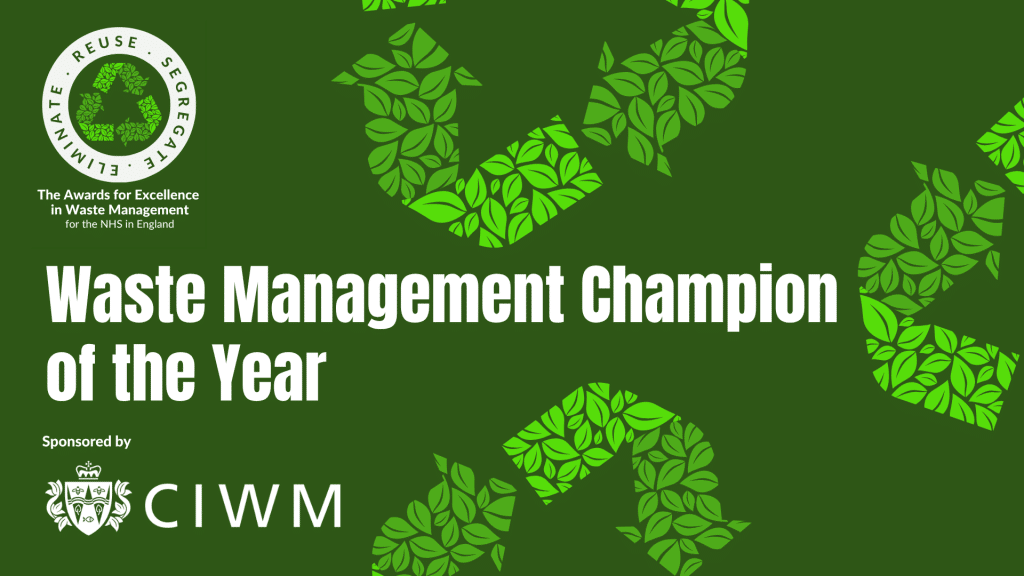
Celebrating an individual who has shown exemplary leadership and dedication in promoting and implementing effective waste management practices, making a significant impact within their Team/Hospital/Trust and Community.
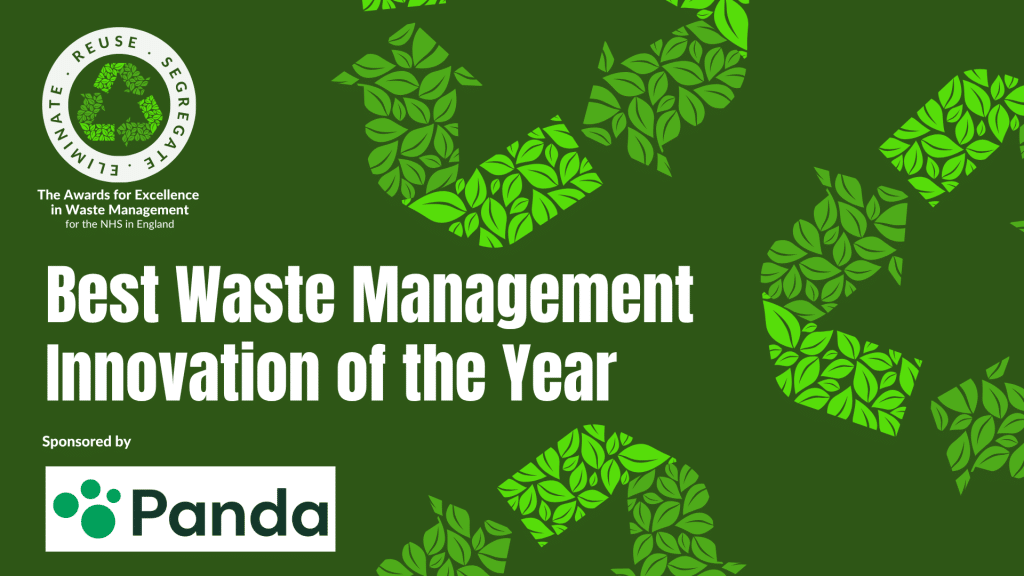
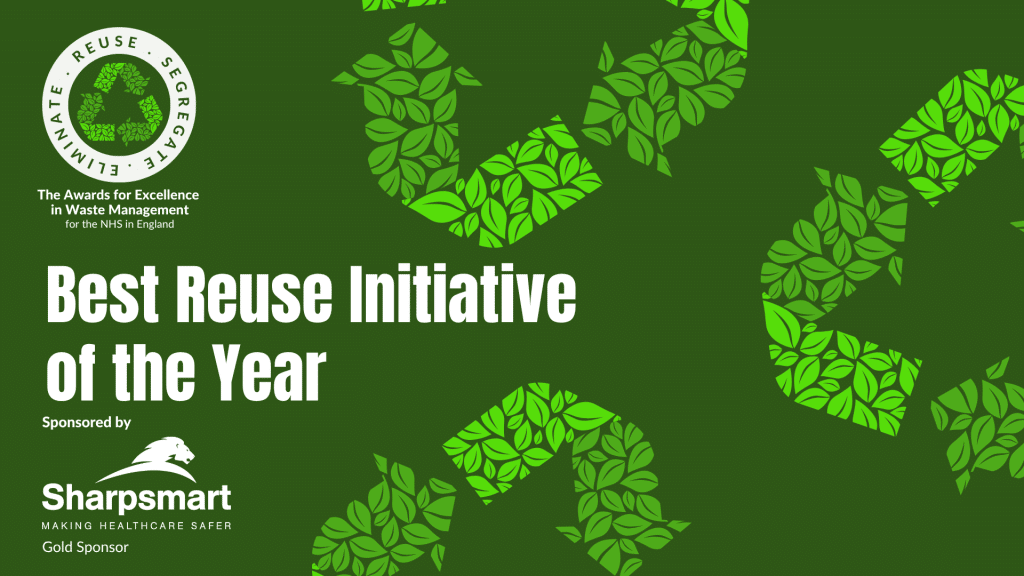
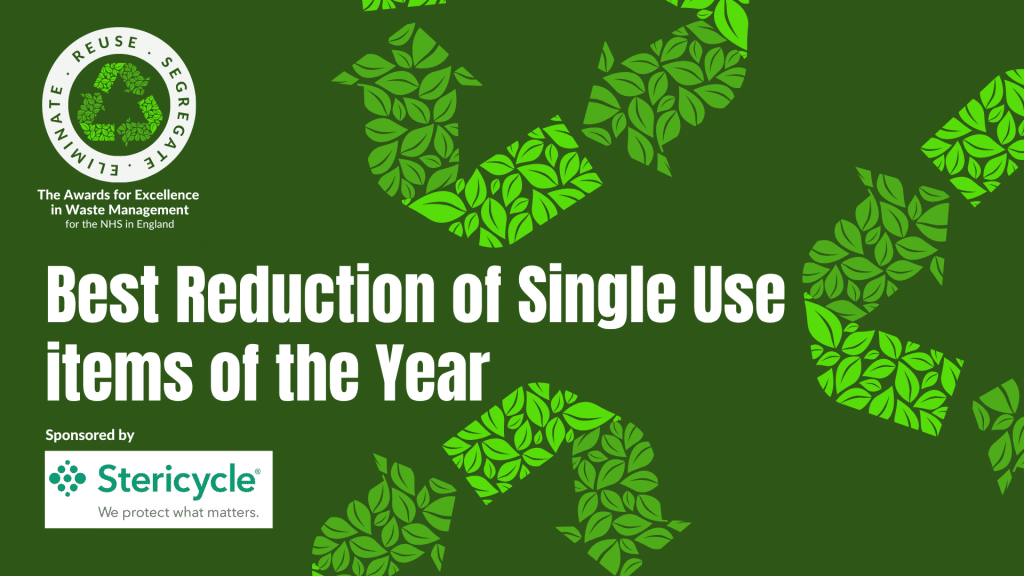
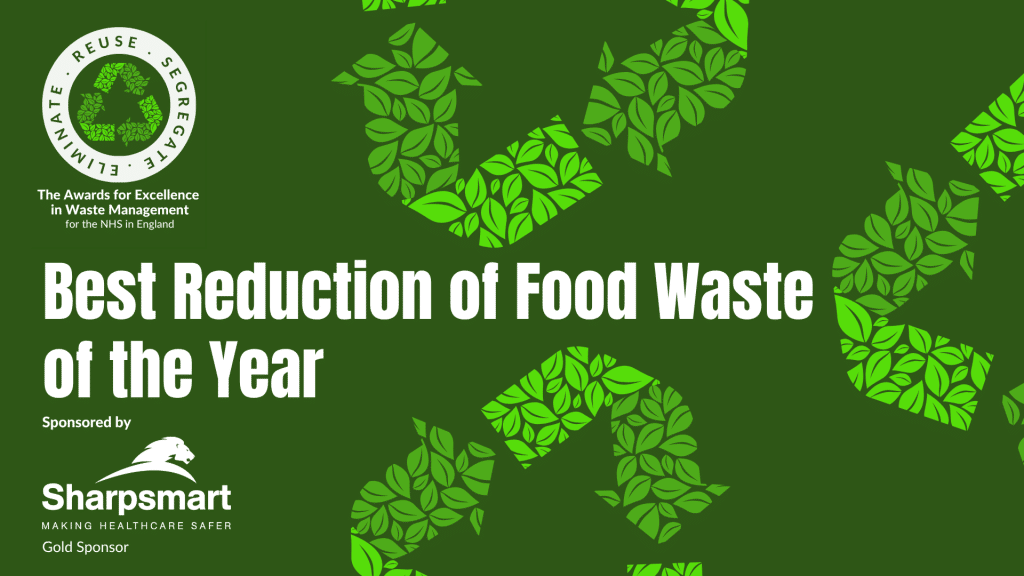
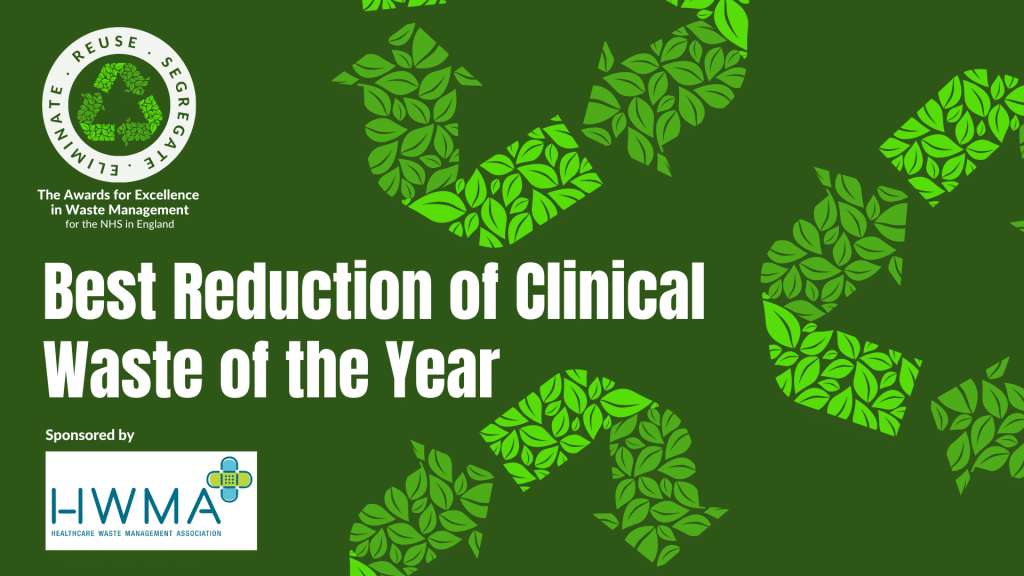
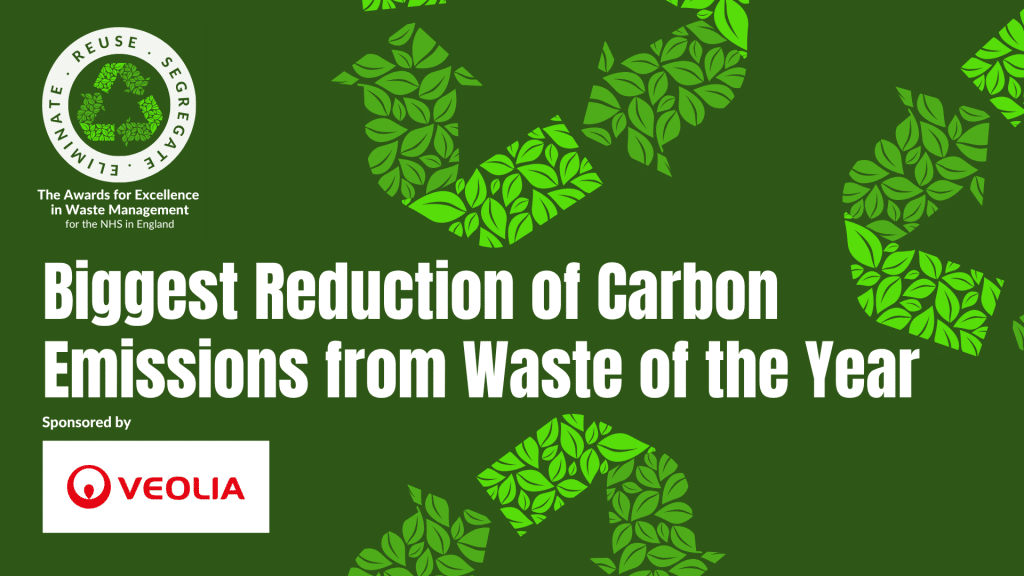
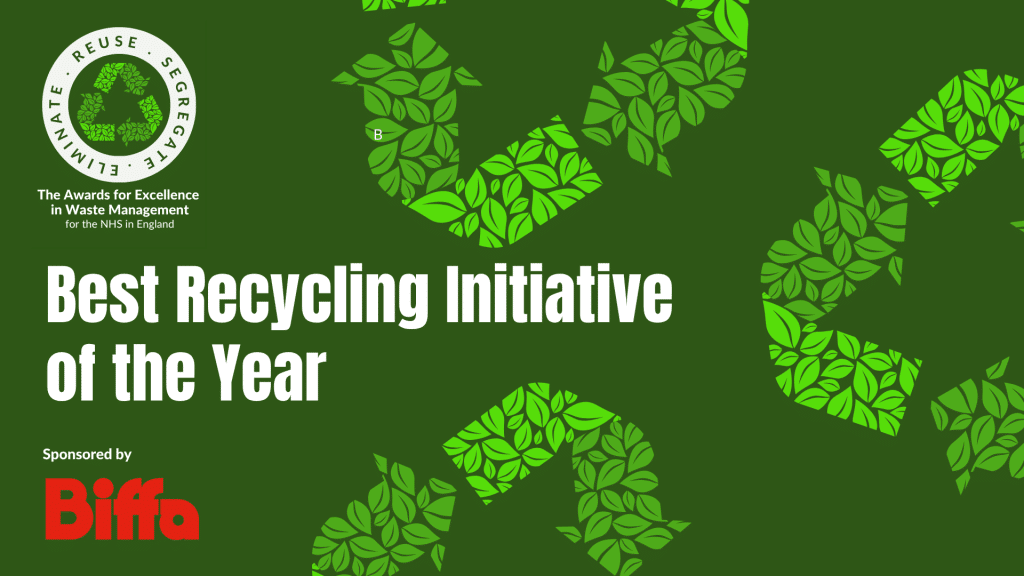
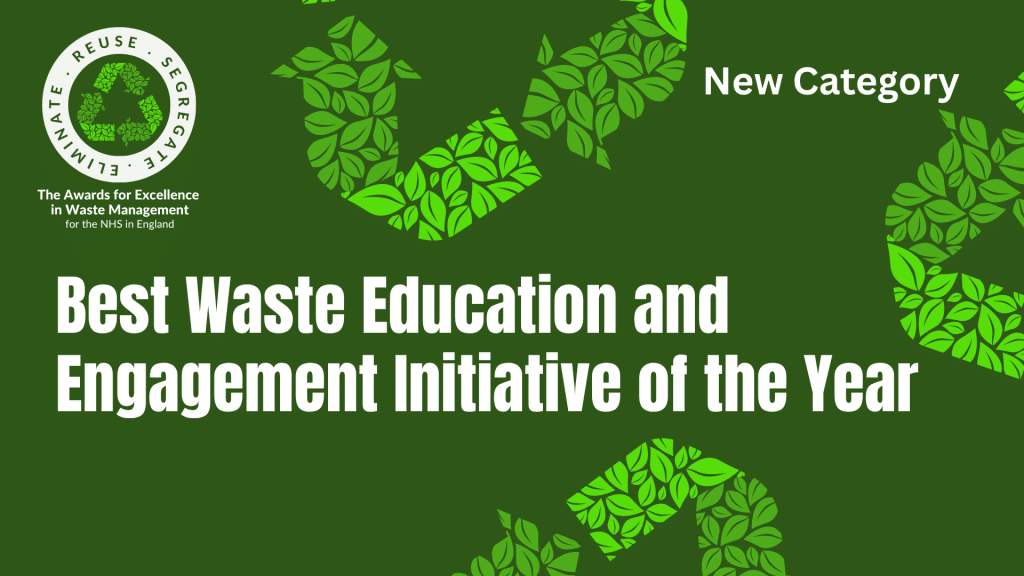
Recognising initiatives that have driven behavioural change, improved staff awareness, or created a culture of sustainability within NHS organisations.
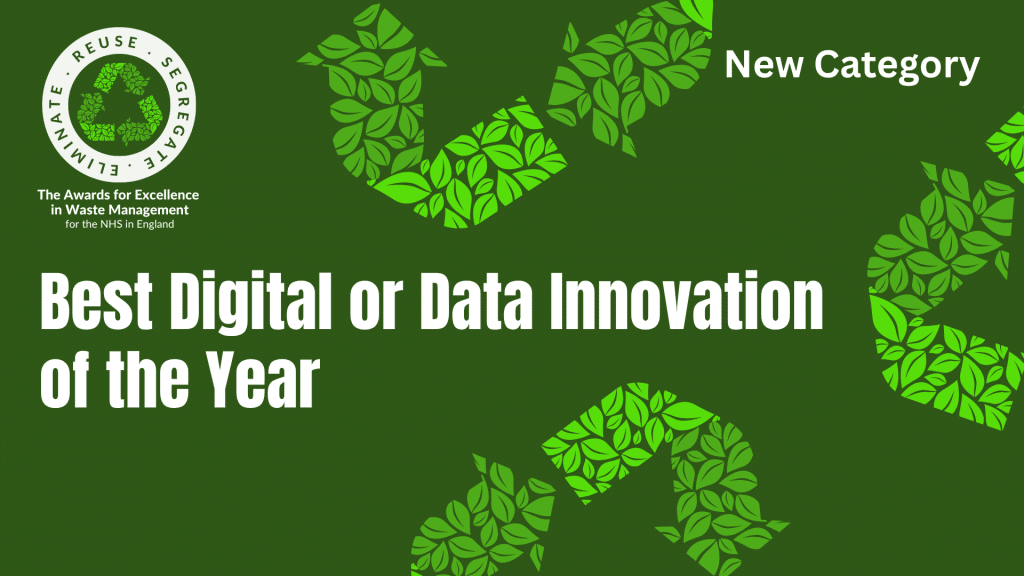
Recognising projects that use technology, analytics, or data-driven solutions to track, reduce, or optimise waste management practices across healthcare settings.
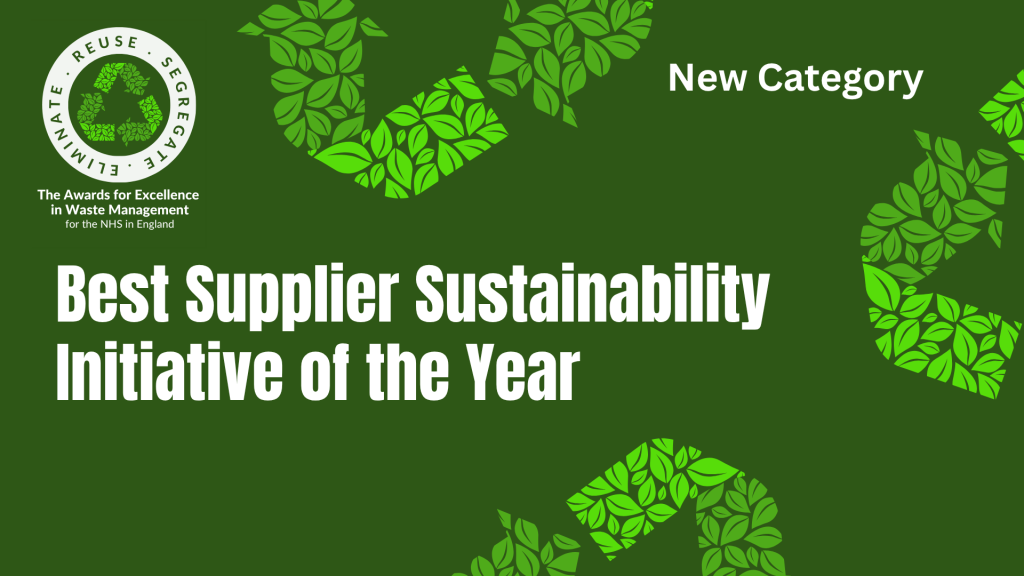
Recognising suppliers, procurement teams, or NHS partnerships that have implemented innovative solutions to reduce waste at source, improve material circularity, or enhance sustainability across the supply chain.
By completing a submission, you are agreeing to the T&Cs of the Awards for Excellence in Waste Management
Our Expert Team of Judges

ANNE WOOLRIDGE (FCIWM)
COO
Peak HSE Ltd

DAN JACOBS
Technical Director – Waste and Resource Management
Mott MacDonald

EMMA BROOKES MSC
Head of Soft FM Strategy and Operations
NHS England

JOAQUIM (JOE) DUARTE
Senior Sustainable Waste Manager
University Hospitals Bristol and Weston NHS Foundation Trust

LIAM HOGG
Head of Waste and Resources
NHS England

MARK GRIFFITHS (MSC CIWFM)
Founder & Managing Director
WMA Consultancy Services Ltd

MAX KINDRED
Net Zero Senior Insight Manager
NHS England

PHILIP SHELLEY FIH
Senior Operational Manager and National Lead for Net Zero Food
NHS England

TIM RADCLIFFE
Net Zero Food Programme Manager
NHS England

JACK STANCEL-LEWIS
Senior Technical Innovation Manager
NHS England

JASON MITCHELL (MCIWM, CEnv)
Waste Manager
The Newcastle upon Tyne Hospitals NHS FT

Sponsor the Awards
Sponsoring The Awards for Excellence in Waste Management for the NHS in England offers a unique opportunity for your brand to align with a cause of paramount importance – the sustainable future of healthcare.
By supporting the programme, a sponsor not only demonstrates a strong commitment to environmental responsibility but also showcases a dedication to the health and well-being of our communities. This initiative allows companies to be associated with innovation, excellence, and leadership in the field of waste management, which is becoming increasingly vital as we address the global challenge of climate change.
Sponsoring the programme provides a platform to amplify our organisation’s commitment to sustainability, engage with key stakeholders, and contribute to the collective effort of creating a greener, more sustainable healthcare sector, thus securing a healthier and more resilient future for all.
For further information on the sponsorship packages available please contact us.
Our Sponsors
Conference & Awards
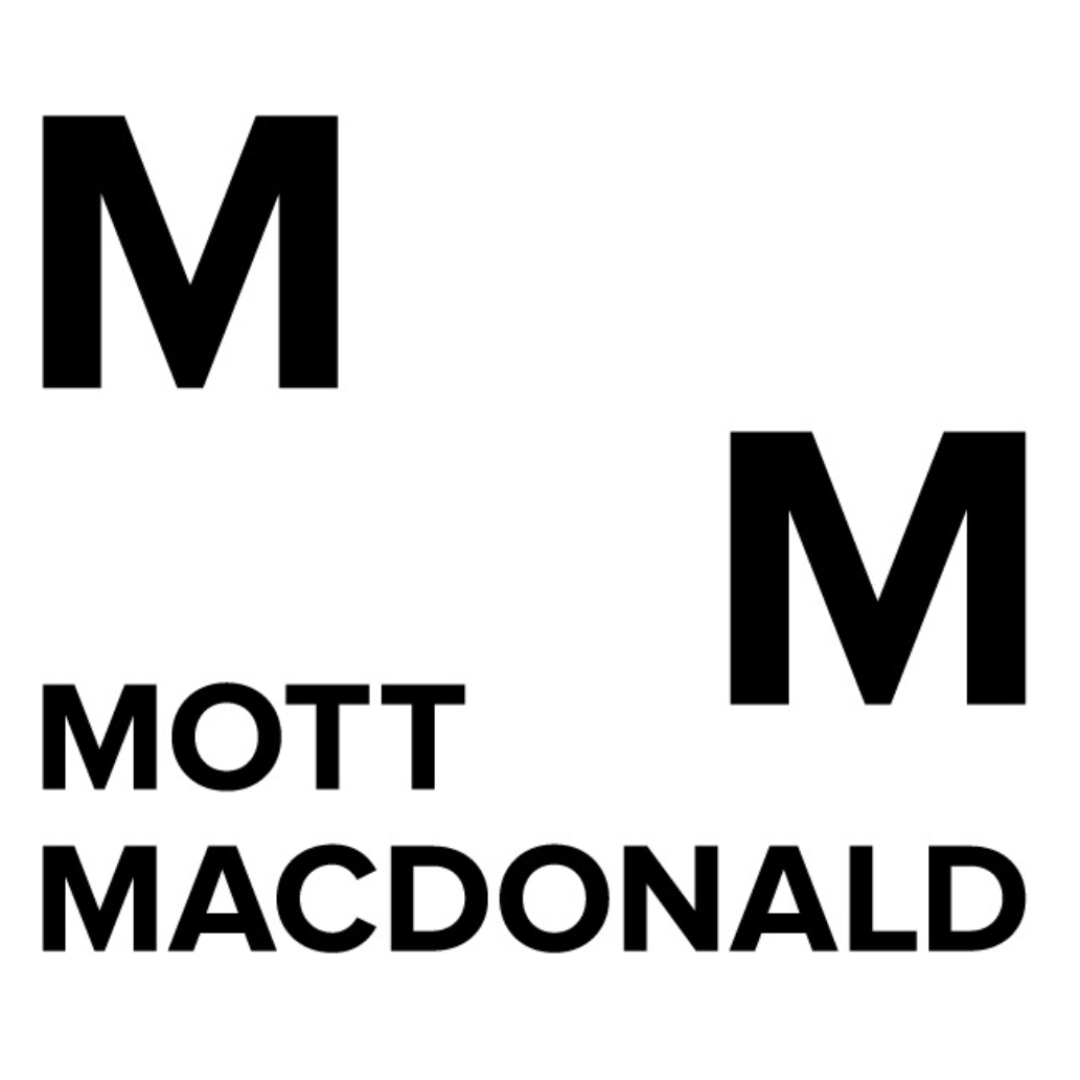
Waste Management Champion of the Year

Best Recycling Initiative of the Year

Best Reduction of Clinical Waste of the Year

Waste Management Team of the Year

Biggest Reduction of Carbon Emissions from Waste of the Year

Best Reduction of Single Use Items of the Year






Our Award Winners in 2025

Waste Management Team of the Year
Gold Winner
University Hospitals of Leicester NHS Trust
Stakeholders
- Stericycle (UK) Limited
- Veolia Environmental Services (UK) Limited
- SUST-N Limited
- Portering and Domestic teams of the Estates and Facilities CMG
- Infection Prevention Control (IPC) team
- Multidisciplinary clinical teams.
Summary: The Trust launched a project during FY23, covering how waste was handled, from cradle to grave, in alignment with the NHS Clinical Waste Strategy and applicable regulations. The end goal was to understand if there were any risks to the Trust that needed to be rectified. The strategy followed a Plan-Do-Check-Act process, which established the need for intensive training of all staff in waste segregation, the introduction of an offensive waste stream, the retendering of contracts, and the development of a digital dashboard to monitor performance, reconcile finances, and measure compliance in waste segregation. In following this approach, the Trust has reduced clinical waste generation by 5.14% from FY24 to FY25, from 2,430.90 tonnes to 2,305.94 tonnes, along with financial savings covering all waste streams of £132,978 in the same timeframe. There has been an overall reduction of carbon dioxide equivalent (CO2e) emissions associated with waste disposal of 53.37%.
Judges’ comments: Excellent work has been conducted by UHL team towards their environmental and financial goals, whilst delivering key NHS targets. It is clear from the submission that work was conducted across key stakeholders, demonstrating innovation, efficiency, and environmental responsibility. The Trust demonstrates that through education and behavioural change methodologists is changing the culture of responsibility to become a sustainable organisation.
Silver Winner
Dartford & Gravesham NHS Trust
Stakeholders:
- Front-Line Domestic Staff
- Front-Line Portering Staff
- Medirest Contract Director
- Medirest Operations Manager
- Medirest Compliance Manager
- Trust Head of Non-Clinical Contracts
- Trust Deputy Head of Non-Clinical Contracts
- Trust Clinical Team
- Suez Waste Manager
Summary: Medirest, working closely with Dartford & Gravesham NHS Trust, has made great strides in transforming the waste management systems at Darent Valley Hospital. Between November 2022 and February 2023, the Trust reported an average waste classification split of 57% Infectious Waste and 43% Offensive Waste. However, in March 2023, a non-conformance issue caused all clinical waste to be classified as Infectious, which led to a significant spike in waste disposal costs. Rather than seeing this as a setback, the Trust took proactive steps to turn things around. They launched an innovative project focused on refining waste segregation, which not only helped resolve the non-conformance but also improved overall waste management and compliance, ensuring a more efficient and sustainable system moving forward.
Judges’ comments:
It is clear that the Trust have worked extremely hard to achieve its goal, it is impressive that various teams have joined forces to achieve a common goal. Detailing the cross work completed across the organisation to reduce waste impacts through staff education.
Bronze Winner
Guy’s and St Thomas’ Foundation Trust
Stakeholders: Sharpsmart, Recorra, Shred-It & Bywaters
Summary: Guy’s Hospital is proud to submit its entry for the 2025 Awards for Excellence in Waste Management, showcasing significant strides in sustainable healthcare practices within the NHS in England. Through a strategic and innovative approach, the hospital has achieved a remarkable 60% segregation in offensive waste, demonstrating a commitment to minimising environmental impact and optimising waste stream segregation. Concurrently, Guy’s Hospital has elevated its recycling initiatives, reaching an impressive 65% recycling rate. These achievements highlight a dedicated effort to enhance operational efficiency, reduce carbon footprint, and foster a culture of environmental responsibility among staff and patients. This submission highlights the hospital’s leading role in implementing best practices in waste management, setting a new benchmark for sustainable healthcare delivery.
Judges’ comments: It is clear from the submission that the Trust have worked hard to achieve its sustainable goals and waste compliance while delivering staff education. The focus on continues improvement is demonstrated by the desire to reinstate mechanisms for increasing an already impressive recycling target.

Waste Management Champion of the Year
Gold Winner
Mark Leighton, Shrewsbury and Telford Hospital NHS Trust
Stakeholders: Stericycle, Sharpsmart, Veolia. Natalie Hutchinson of ISSL.
Summary: Since assuming his role under two years ago, Mark has demonstrated exceptional leadership and innovation in transforming waste management across the trust. He developed a comprehensive waste management strategy and established robust governance by forming and Chairing a Waste Management Group, ensuring compliance and accountability. Mark successfully overhauled clinical waste management, aligning it with the NHS Clinical Waste Strategy, and introduced key initiatives such as cardboard balers. Through wide engagement and communication, he has driven positive behavioural change among staff at all levels, supported by developing a mandatory training package. Mark’s integrated approach has unified waste management across all sites, embedding them within Portering and Facilities Management. Additionally, he introduced new policies and a furniture repair and re-upholstery service to minimise waste and generate savings. Collectively, Mark’s initiatives and process overhaul have so far saved the trust over £200,000, demonstrating both environmental and waste awareness as well as financial acumen.
Judges’ comments: A very strong entry. Mark has covered all of the bases and demonstrated a comprehensive and methodical approach to promoting waste segregation and reduction across his trust. Very impressive programme of work, fully engaging across the trust and at all levels and with waste contractors has achieved demonstrable results in a relatively short space of time.
Silver Winner
Beth Owen: East of England Ambulance Service NHS Trust
Stakeholders: Clare Cable, NHSE
Summary: Since introducing offensive waste at the East of England Ambulance Service in January 2024, they became the second ambulance service in the country to exceed the 60:20:20 NHSE target in August 2024. Beth Owen, Facilities Manager for the Trust, was keen to share the learnings from this, and support other Ambulance Trusts in replicating this success for their own organisations. With the support of Clare Cable at NHSE, a National Ambulance Waste Collaboration Group was formed, with waste managers from each ambulance service across the UK. Beth put together a suite of documents for the Future NHS Hub, with posters, signage, action plans and templates for everyone to utilise, and report back on their progress or work through any barriers at the meetings. As a direct result of this group, all Ambulance Trusts are now working towards achieving 60:20:20 within this financial year.
Judges’ comments: A very strong submission. In particular Beth’s collaborative approach and the desire to take her ideas beyond her own organisational boundaries to the wider national ambulance services – that is the mindset of a waste champion.
Bronze Winner
Nathaniel Kitching, County Durham and Darlington NHS Foundation Trust
Stakeholders: n/a
Summary: Starting with no prior management experience, this nominee stepped into a developmental Waste Monitoring Officer role. Through completing the CIWM NHS Waste Manager course and extensive self-led research, they transformed their knowledge into action, aligning waste practices with HTM 07-01 and national NHS targets. Their initiative led to a significant reduction in high-cost waste streams such as Anatomical and Infectious waste, while increasing the use of more sustainable Offensive waste. They also introduced cost-saving measures, including switching to a local WEEE contractor and renegotiating scrap contracts to generate income. Despite rising costs, overall waste expenditure remained stable. Their work has improved sustainability, increased organisational awareness, and demonstrated measurable environmental and financial impact. With a commitment to continuous improvement, they plan to further their education and expand waste awareness across and beyond the organisation. This entry showcases leadership, innovation, and a passion for sustainable change.
Judges’ comments: A strong entry. This is an excellent example of a person starting with no management experience and striving to improve not only themselves within their discipline but also waste outcomes, cost savings and ensuring compliance while taking people with him. Dedication, Competence and Confidence in making his own decisions really shines through here.

Best Waste Management Innovation of the Year
Gold Winner
Royal Free London NHS Foundation Trust
Stakeholders: Darren Eastman, Laura Smith
Summary: Since 2022, Royal Free London NHS Foundation Trust (RFL) has made significant strides in transforming its clinical waste management to align with NHS England’s Clinical Waste Strategy, aiming for net-zero carbon emissions by 2040. In response to post-COVID challenges, the Trust established the Estates and Facilities Sustainability Waste Working Group, enhancing staff training, improving non-conformance reporting, and adopting lower-carbon disposal methods. These initiatives led to a strategic shift in waste segregation: • 2022/23: 9% incineration, 82% alternative treatment, 9% offensive waste • 2023/24 9% incineration, 52% alternative treatment, 39% offensive waste • 2024/25: 9% incineration, 27% alternative treatment, 64% offensive waste RFL’s proactive approach demonstrates a commitment to sustainability, operational excellence, and alignment with national environmental goals. As a result of our efforts Alternative treatment (AT) waste was reduced from 1,671 tonnes in 2022/23 to 568 tonnes in 2024/25 — a 66% decrease over two years.
Judges’ Comments: Comprehensive and data-driven approach to transforming waste management. By combining scanning technology to support digital audit approach, QR code training bespoke to different clinical groups, and clear signage, they achieved a 66% reduction in AT waste and 373 tonnes of CO2 over 2 years. They conducted 115,000 scans inn 24/25 with over 26,000 images taken. This demonstrates effective way to use technology and process redesign to deliver environmental impact and improve waste segregation. Further strengthened by continuing to embed culture change for all staff. Standout example of how innovation can scale across a large Trust demonstrating how data led interventions, and cross functional engagement can drive measurable environmental impact.
Silver Winner
University Hospitals of Liverpool Group (Liverpool University Hospitals NHS Foundation Trust
Stakeholders: Mike Morgan, Tony Claro and SRCL.
Summary: In a bid to meet the 20-20-60 waste split target set by NHS England, Liverpool University Hospitals NHS Foundation Trust partnered with Sharpsmart to implement the offensive waste stream at two acute sites that previously did not produce any offensive waste. The project followed a focused implementation plan, which included a wide range of educational materials and online training to ensure all clinical areas were able to introduce the new waste stream safely and compliantly by the end of the 2024/25 financial year. Over a two-week implementation period, the offensive waste stream was successfully rolled out across both sites. As a result, the Trust is now diverting an average of 54 tonnes of infectious (orange bag) waste each month into the offensive waste stream, achieving a 40% reduction in clinical waste. This initiative demonstrates how targeted education and strong collaboration can deliver significant environmental and operational benefits.
Judges Comments: Introduction of offensive waste streams across two acute hospitals utilising sharp smart digital audit, educational and digital tool. The plan included engagement with key clinical stakeholders, use of tailored training materials, and site-level walkthroughs Training and education delivered to 1,000 staff combined with posters, bin labels, and QR code linked quizzes for education. The project cut clinical waste by 40% (54 tonnes per month) and saving 12 tonnes of CO2 monthly- set to meet 20:20:60 in 25/26. would have been good to see financial savings achieved reported alongside the environmental gains. A good example of how engagement and education can drive change, alongside digital tools- operational project but showcases good examples of innovation.
Bronze Winner
University Hospital Southampton Estates Limited (UEL)
Stakeholders: Stericycle UHS Estates Limited (UEL) University Hospital Southampton
Summary: University Estates Limited (UEL) has pioneered the use of safety culture software to audit clinical waste processes, replacing outdated manual methods with a smart, data-driven approach. By customising a platform traditionally used for incident reporting and behavioural safety, we developed a bespoke audit tool and with the use of Power-Bi created a reporting dashboard that tracks compliance, highlights waste segregation issues, and generates clear, actionable insights. The innovation has reduced risk, improved sustainability practices, and provided transparency in waste handling—helping UHS align with NHS Net Zero ambitions. The approach also empowers staff at all levels to take ownership of waste compliance through intuitive dashboards and real-time feedback. The project has also identified clear actions required to enable clinical waste to be removed from high incineration charges and processed and billed through the correct waste route. Significantly reducing expenditure.
Judges’ Comments: Innovative project that repurposed safety culture software to create a digital waste auditing tool. This has transformed a manual process into one that is now digital and data-led- engaged with clinical staff to design the process, ensuring it met their needs. The tool / approach includes dashboards, real-time reporting, and new waste ambassadors. The project has resulted in improved compliance to over 92% in some areas, however, some areas still not meeting compliance requirements. They have projected savings of £117k, £108k and £80k across the three phases per year. Although submission highlighted that is difficult for them to measure carbon savings, it would be good if they could estimate carbon reduction alongside audit compliance and financial evidence. Currently savings are projected, and it would be great to see their submission next time with achieved savings. A good example of digital innovation in waste management .

Best Reuse Initiative of the Year
Gold Winner
Salisbury NHS Foundation Trust
Stakeholders: n/a
Summary: The Sustain & Reclaim Centre at Salisbury NHS Foundation Trust, consists of a part-time Team Leader, employed by the Trust, and 20 Volunteers who are the lifeblood of the centre enabling the Trust to reuse non-medical assets including furniture & ambulatory aids, and who also provide a re-upholstery service for both clinical and office furniture. Established in 2010 the Centre has gone from strength to strength in helping to reduce resources, reduce our impact on the environment, reduce costs/cost avoidance, and provide volunteering opportunities.
Silver Winner
Mid and South Essex NHS Foundation Trust
Stakeholders: Aguettant Ltd
Summary: The NHS is a major contributor of UK climate emissions, of which, anaesthetic practice is a significant cause. Anaesthetists across the NHS, and most of the world, currently draw up emergency drug trays every morning for their surgical cases. As emergency drugs are rarely required to be administered, and these prepared syringes cannot be reused due to infection control and drug degradation concerns, the majority of these drugs and single-use plastics are discarded after surgical cases. This project implemented pre-filled emergency drug syringes (which can be reused if unopened) within the anaesthetic rooms of Broomfield Hospital. The project has resulted in multiple improvements, including: i. Reduced 2024/25 annual departmental expenditure by £22,048; ii. reduced drug and single-use plastics wastage, improving departmental environmental sustainability; iii. reduced clinician time on the daily preparation of emergency drug trays, improving productivity; and reduced risk of drug errors and contamination, thereby improving patient safety.
Bronze Winner
Essex Partnership University NHS Foundation Trust (EPUT)
Stakeholders: GoGreen Managed Services Ltd (GGMS)
Summary: The Re-use Programme transforms how EPUT manages its Equipment, Furniture, Fittings, Components and Materials (EFFC&M), integrating a fully managed model powered by the digital SmartED-i® platform. This enables real-time identification, tracking and interrogative data reporting of the Trust’s existing EFFC&M. The GGMS model works hand in hand with SmartED-i®, offering services including collection, repair, and redistribution of EFFC&M—prioritising internal re-use before enabling external NHS sharing, resale, charitable donation and zero waste to landfill recycling. This long-term, compliant approach gives EPUT full control over its assets while supporting sustainability goals. The programme aims to reduce waste, cut embodied carbon, maximise NHS asset value, and facilitate inter-Trust collaboration. It has already successfully managed over a thousand assets and contributed to positive social value outcomes through donations. By embedding circular economy principles into daily operations, EPUT is setting a new benchmark in sustainable asset management for the healthcare sector.

Best Reduction of Single Use Items of the Year
Gold Winner
Guy’s and St Thomas’ NHS Foundation Trust
Stakeholders: n/a
Summary: The Gloves Off campaign at Guy’s and St Thomas’ NHS Foundation Trust was created to educate staff when it is appropriate to wear non-sterile gloves. It aims to reduce plastic waste, save money and protect staff and patients from infections and hand health conditions. Between September 2024 and May 2025, the Trust has saved two million gloves, equating to 10 tonnes of plastic, 52 tonnes of carbon emissions and £250,000 saved in procurement costs. This has been achieved on a low budget by implementing a wide-ranging, creative comms and engagement plan which has helped colleagues to feel informed and empowered to make the right choices.
Silver Winner
Derbyshire Support & Facilities Services (DSFS) and Chesterfield Royal Hospital
Stakeholders: Stacey Burton, Clinical Improvement Programme Lead, Cem Cahit, Logistics and Supply Chain Manager, Cem Cahit, Logistics and Supply Chain Manager, Amanda Porter, Infection and Prevention Control Nurse, Kimberley Wynn, Lead infection prevention and control/TB, Sally Ludditt, Senior Health, Safety and Environmental Advisor
Summary: The Royal Academy of Improvement promotes the use of a Waste Wheel based on the TIMWOODS methodology (Transportation, Inventory, Motion, Waiting, Overproduction, Overprocessing, Defects, and Skills) to identify and reduce waste within the organisation. The Royal Academy acknowledges that ideas often originate from the “shop floor.” One such idea was to change single-use plastic catheter stands to wipeable reusable catheter stands. This initiative was initially identified within the maternity department and initiated by the infection control team. After maternity successfully implemented the switch, it became evident that the project could be expanded to include the rest of the Trust, where it has proven to be effective in practice.
Bronze Winner
Northumbria Healthcare NHS Foundation Trust
Stakeholders: ECO ED Team
Summary: The Emergency Department at NSECH implemented an innovative Quality Improvement Project aimed at reducing the unnecessary use of fluoride oxalate (grey top) blood bottles, a common single-use item contributing to plastic waste. Inspired by the Royal College of Emergency Medicine’s (RCEM) Green ED scheme, the ‘ECO ED’ team focused on reducing environmental impact while improving clinical relevance and efficiency. Through stakeholder engagement, protocol changes, and targeted education, the project achieved a remarkable 90.1% reduction in grey top bottle usage. This directly reduced single use plastic waste, cut CO₂ emissions, and reduced unnecessary tests for labs. The initiative exemplifies how low-cost but high-impact change can drive both waste reduction and healthcare improvement.

Best Reduction of Food Waste of the Year
Gold Winner
Maidstone and Tunbridge Wells NHS Trust (MTW)
Stakeholders: Sharpsmart Ltd
Summary: Maidstone and Tunbridge Wells (MTW) Trust provides a full range of general and specialist services to around 600,000 people living in West Kent and East Sussex.
An Independent Review of Hospital Food (2020) concluded that a nutritious meal can have a profound impact both on our mental and physical health and on our ability to recover from illness or surgery. Working in partnership with Sharpsmart and our objectives clear, it was determined that an evidence-based approach was required to engage the workforce, change thinking and drive behaviour change aimed at reducing food waste whilst improving patient care. MTW Trust began segregating food waste from wards and restaurants in October 2024. Maidstone hospital after only 8 months:
– 36% reduction in food waste.
– Increased recycling rate by 13%.
– Avoided 58% CO2e per tonne.
– 6% reduction in food procurement costs.
– Return on investment – less than one month.
Judges’ comments: This is an outstanding submission. Strong realisation of the targets, driven by the mandatory food standards. Named personal and the role that they need to play if the actions are to be long standing. The shape of the actions also provides the foundation for a consortium approach – this is exactly what is needed if we are to have a full understanding of how to reduce and maintain low levels of food waste. Using data as evidence is a powerful tool, which they have in abundance – this is only effective if everyone understands their role, which is obviously the case.
Silver Winner
Royal Surrey County Hospital
Stakeholders:
- Medirest (Steamplicity Catering Provider)
- FSG (Reusable Container Partner)
- Olio (Food Redistribution Partner)
- Too Good To Go (Food Redistribution App)
Summary: In 2025, Royal Surrey County Hospital turned the tide on food waste—not just through technology, but by putting patients, people, and the planet at the heart of its kitchen. At the core of this achievement was the continued use of Medirest’s Steamplicity system, enabling freshly prepared, patient-tailored meals and reducing overproduction. ‘The Source’, a real-time waste tracking platform, empowered teams to align food supply with actual demand, while collaboration with dietitians ensured nutritional excellence. Strategic partnerships with Olio and Too Good To Go redirected surplus retail food into the community, and a trial with FSG replaced single-use plastics with reusable pots, cutting packaging waste. These initiatives led to a 49.99% reduction in food waste, improved patient satisfaction, and saved over £14,000. Royal Surrey’s holistic, data-driven approach has not only delivered measurable impact but set a new standard for sustainable healthcare catering in the NHS.
Judges’ Comments: This is a super submission – much of the wording expresses the partnership working across the teams, with external partners and also future innovations. The approach has a strong foundation around staff training, and redistribution and of course the food service delivery which is a strength of the Steamplicity model. The provided data suggests a substantial reduction of food waste, but to take this submission to the next level there needs to be more detail and breakdown of the data – understanding the food waste achievements.
What I like is the continued vision, be proud of the achievements but understand the next steps and how all of the team are involved in that process.
Bronze Winner
Manchester University NHS FT
Stakeholders: n/a
Summary: I have initiated and led on a 2 waste reduction projects: 1. Food waste reduction project on the wards in inpatient areas (in trail 3 wards the waste exceeded over 4 tones per 90 days) 2. Reduction of the use of disposable dishes (annual spent was exceeding £200k and excessive amount of waste). I have therefore created a task and finish group on 3 wards to engage the ward staff and PFI partners to ensure all staff are aware of the processes allowing reduction. Those included reassessing and providing training on ordering, reimplementing meal time standards, daily auditing and weighing of the waste. For the reduction of disposable dishes, I have included senior and ward level teams in the first instance to make them aware of the cost and carbon footprint. I have also reiterated the process for obtaining the standard items and worked within the MFT and Sodexo Values.
Judges Comments: This is a good submission, which reflects a team approach at an enormous trust – huge impact potential. However, there is a lack of detail on the work taking place which I think dilutes the submission. The interventions around auditing, team communication and food service arrangements certainly project ward savings, I would like to understand the role of accountability in the reduction of food waste.
This is an exceptional team, it is likely that the best results and provision of evidence is probably ahead of us – these results are likely to get stronger and more definite in the next 12 months.

Best Reduction in Clinical Waste
Gold Winner
Northumbria Healthcare Facilities Management
Stakeholders: n/a
Summary: Since joining Northumbria Healthcare in December 2023, the Trust’s new Waste Manager has led a proactive programme to reduce clinical waste and associated carbon emissions. This has been achieved through targeted audits, operational changes, and collaborative staff engagement. Through optimised segregation, targeted education, and expansion of the offensive waste, hazardous waste was minimised and segregation was improved across theatres, labs, ED, and wards. Notably, the introduction of tiger bags into the ED at NSECH led to a 12% reduction of infectious waste at site level. As a result, the Trust achieved a 26% reduction in waste-related carbon emissions—a decrease of over 53,000 kg CO₂e year-on-year. This was driven by auditing and reconfiguring long-standing clinical practices, not just shifts in national carbon factors. In a recent benchmarking exercise across the NENC region, Northumbria Healthcare achieved the best clinical waste split, achieving a 74:20:5 ratio—the first in the region to fully meet this.
Judges’ comments: The simplicity of this campaign was the key to its success. The objectives and outcomes are clearly presented, as are ideas for further reduction initiatives. What sets this application apart is that the focus was not only on how waste segregation can reduce clinical waste, but on other aspects that help to reduce overall waste.
Silver Winner
Shrewsbury and Telford Hospital NHS Trust
Stakeholders: Stericycle, Sharpsmart
Summary: Over the past 18 months, Shrewsbury and Telford Hospital NHS Trust (SaTH) have achieved a remarkable transformation in clinical waste segregation and compliance. Previously requiring NHSE intervention during COVID-19, the Trust was producing only 0.65 tonnes (0.5%) of offensive waste and 86.62 tonnes (83%) of infectious waste per month in 2023. Through strong leadership, effective communication, cross-departmental collaboration, and sustained behavioural change, SaTH has reversed these figures. The Trust now averages 72.47 tonnes (76%) offensive waste and just 14.01 tonnes (14%) infectious waste each month. This not only surpasses NHSE’s target of 60% offensive waste but has achieved it two years ahead of target. As a result, the Trust has also delivered financial savings in excess of £150k. SaTH’s commitment to best practice, staff engagement, and sustainable waste management has delivered a significant operational, financial and environmental success, setting a benchmark for other NHS trusts to follow.
Judge’s comments: A well set out application, clearly demonstrating how significant financial savings can be achieved through improved segregation. The practical steps taken to achieve this are comprehensively described. Embedding waste into induction training is an excellent next step. Full marks could have been scored with specific examples of other waste reduction initiatives.
Bronze Winner
Doncaster & Bassetlaw NHS Foundation Trust
Stakeholders:
- DBTH Waste & Sustainability Team
- DBTH Theatre Management
- Infection Prevention and Control (IPC)
- DBTH Clinical Governance Team
- DBTH Estates & Facilities Team
- Procurement and Supplies
- External Waste Contractor (Veolia)
- E & F Sustainability Board
Summary: Doncaster & Bassetlaw NHS Foundation Trust is proud to submit this bid for Best Reduction of Clinical Waste of the Year demonstrating our cost saving and carbon reducing transition from orange bag waste to tiger bag offensive waste disposal. This change was driven by a review identifying that a high volume of theatre waste was unnecessarily disposed of as infectious waste, incurring excess cost and carbon emissions. The switch to tiger bags, has resulted in substantial reductions in clinical waste tonnage. From January to May 2025, the Trust achieved a carbon saving of approximately 13.95 tonnes CO₂e compared to the same period in 2024. This was achieved through a 24.3% reduction in clinical waste and corresponding 16.3% increase in offensive waste, which carries a significantly lower emissions factor. The outcome demonstrates that improved waste segregation supports both financial efficiency and environmental impact reduction in line with NHS Net Zero goals.
Judges’ comments: A very complete submission, illustrating how a clear evaluation of current practices can pin point specific areas for improvement, scaling up from a trial. The involvement and buy-in from IPC staff were critical in rolling out the OW stream more widely. The proposed next steps will help scale up the roll-out more completely.

Biggest Reduction in Carbon Emissions from Waste of the Year
Gold Winner
University Hospitals of Leicester NHS Trust
Stakeholders:
- Stericycle (UK) Limited
- Veolia Environmental Services (UK) Limited
- SUST-N Limited
- Portering and Domestic teams of the Estates and Facilities CMG
- Infection Prevention Control (IPC) team
- Multidisciplinary clinical teams.
Summary: The Trust launched a project during FY23, covering how waste was handled, from cradle to grave, in alignment with the NHS Clinical Waste Strategy and applicable regulations. The end goal was to understand if there were any risks to the Trust that needed to be rectified. The strategy followed a Plan-Do-Check-Act process, which established the need for intensive training of all staff in waste segregation, the introduction of an offensive waste stream, the retendering of contracts, and the development of a digital dashboard to monitor performance, reconcile finances, and measure compliance in waste segregation. In following this approach, the Trust has reduced clinical waste generation by 5.14% from FY24 to FY25, from 2,430.90 tonnes to 2,305.94 tonnes, along with financial savings covering all waste streams of £132,978 in the same timeframe. There has been an overall reduction of carbon dioxide equivalent (CO2e) emissions associated with waste disposal of 53.37%.
Judges’ comments: Such incredible progress to hit the national targets
Silver winner
Lancashire and South Cumbria ICB
Stakeholders:
- NuGreen Ltd
- Park View Surgery
- Milnthorpe
- Central Lakes Medical Group
- Ambleside
- Over Wyre Medical Centre
- Over Wyre
Summary: The project was a proof-of-concept pilot of The NuGreen 4 Stage Approach. NuGreen built the approach with the purpose of improving recycling rates, whilst reducing costs and carbon emissions in healthcare through optimised waste segregation, environmental restructure, and behavioural interventions. The project was completed for the NHS Lancashire and South Cumbria Integrated Care Board across three different sites. The project saved an average of 519kg CO2e and £529 per tonne of clinical waste produced.
Judges’ comments: Very well written and also good to see it in community care which matches the 3 shifts set out by the government
Bronze winner
Manchester University NHS Foundation Trust (MFT)
Stakeholders: MFT and PFI partner Sodexo
Summary: The MFT Waste team achieved significant success during 2024/25, cutting carbon across every waste disposal route. The waste carbon footprint shrunk by 20% compared to the previous financial year 2023/24, saving 323 tCO2e. This is the equivalent carbon produced by 100 average UK homes in one year. The largest carbon saving has come from the ongoing behaviour change campaign to ‘switch to tiger’, pushing clinical staff to correctly segregate the majority of clinical waste as offensive in tiger bags rather than as infectious in orange bags. Working towards a target of 60% tiger, the Waste Team collaborated with multiple key stakeholders to prepare for the switch, before engaging staff across the trust and rolling out the waste stream to ten hospitals and many community sites. The waste team’s commitment and collaborative efforts have shown measurable progress towards a sustainable waste management system within the Trust.
Judges’ comments: Not to be underestimated the efforts to improve such a massive trust
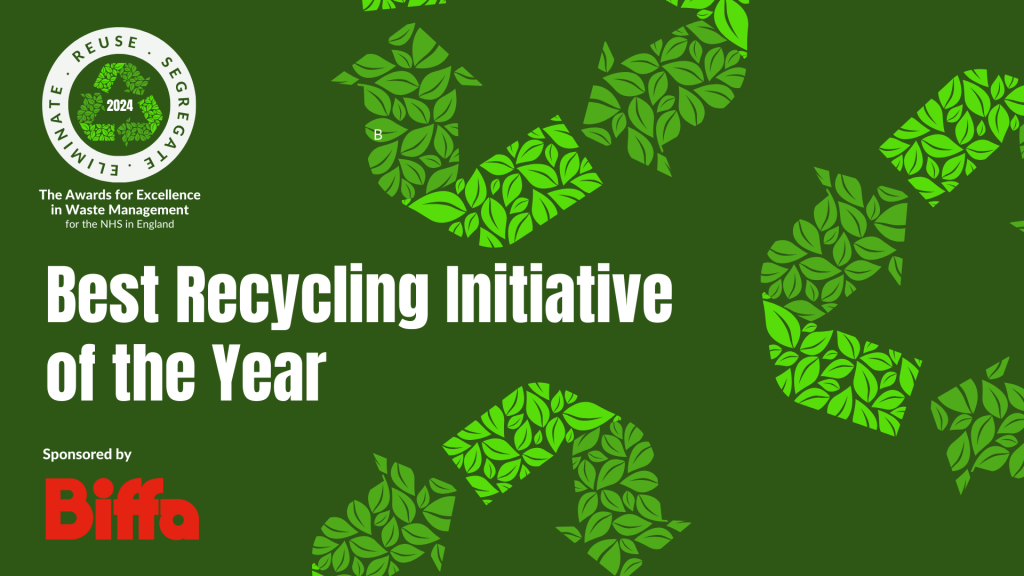
Best Recycling Initiative of the Year
Gold Winner
Manchester University NHS Foundation Trust (MFT)
Stakeholders: PFI partners Sodexo, Johnson & Johnson (J&J), J&J schemes powered by MyGroup and Resouricfy
Summary: The innovative new theatres recycling scheme, led in partnership by Manchester University NHS Foundation Trust (MFT) and J&J, is a pioneering initiative aimed at enhancing waste management practices of difficult to recycle items in theatres. The project focuses on recycling various medical and non-medical waste materials, including suture foils, sterile tubes, and contaminated items such as energy devices and suture relay trays. MFT is the first trust in the country to be live with all three recycling programmes. Historically, these single-use items have been processed through clinical waste disposal streams, with no option of material recovery. With strong collaborations between Sodexo, J&J, and various teams across MFT, the scheme has successfully implemented recycling points across multiple theatres, achieving waste reduction and carbon savings at the same time as fostering a culture of environmental responsibility and sustainable waste management within the Trust.
Judges’ comments: A great partnership approach to recycling involving many partners and clearly moving in the direction of net zero
Silver Winner
Hull University Teaching Hospitals
Stakeholders: Karen Alexander (Client Account Manager, Mitie Waste and Environment), Mike Lamb (Waste Support Officer, HUTH), Alex Best (Deputy Director, Capital and Sustainability, HUTH)
Summary: In partnership with Mitie, HUTH became the first trust to deliver the first on site Mini-Mixed Recycling Facility in the NHS across England. Securing capital funding via an ambitious 15-month target to return on investment and make waste management a cornerstone of HUTH’s zero30 goals, the trust expects to deliver on an 80% recycling rate across general waste streams and become a leader in improving the waste hierarchy across healthcare domestic waste for trusts to follow. Both Mitie and HUTH view the project as a flagship to symbolise our commitment to sustainability and becoming market leaders in investing in waste management, showing reducing costs and carbon do not have to be mutually exclusive; making proactive change brings a universal benefit to the NHS.
Judges’ Comments: An innovative solution that should could / should be developed into a wider use solution for onsite processing of recycling waste
Bronze Winner
THE DUDLEY GROUP NHS FOUNDATION TRUST
Stakeholders: Nutricia – feeds, Mitie FM / Mitie Waste
Summary: The ITU Sustainability Group has led a transformative year of action, reduced clinical waste and embedded greener practices into critical care. Their initiatives include recycling feed bottles and IV fluid bags, minimising medicine waste, and cutting unnecessary blood testing and glove use. A shift from 50ml syringes to 100ml propofol bottles saved 125 nurse hours, nearly 11,000 syringes, and £3,858. A separate project to reduce daily blood glucose tests saved £1,600 and avoided 8,000 plastic bottles, equivalent to over 1.1 tonnes of CO2e. The team has engaged staff through training, visual aids, newsletters, and a Green Noticeboard, while also presenting their successes at national events. Their work shows how frontline clinical teams can drive both sustainability and quality care.
Judges’ comments: A well thought out approach, multilayered and well resourced. Well done
Awards Ceremony
Thursday, 2nd October 2025
Royal Armouries,
Leeds
LS10 1LT
